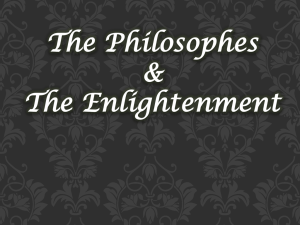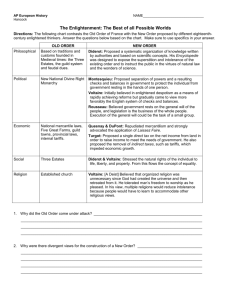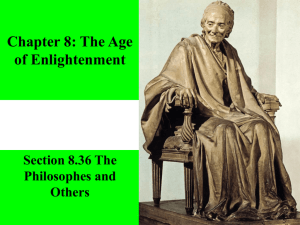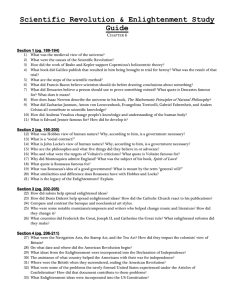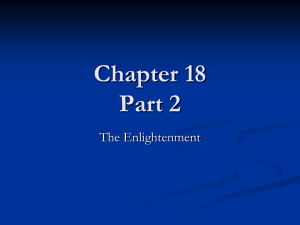The Enlightenment
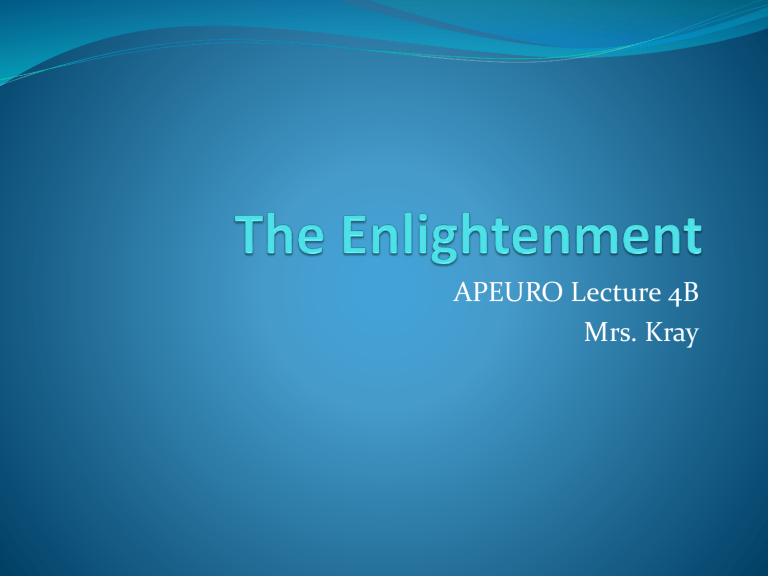
APEURO Lecture 4B
Mrs. Kray
An Overview of the 18
th
c.
Political History Age of Reform
Britain – constitutional monarchy; France – royal absolutism;
Prussia, Austria, & Russia – enlightened despotism; Ottoman
Empire – traditional empire
Intellectual History Newtonian Physics; Age of Reason
Rise of the Enlightenment -- An effort to apply the methods and principles of the Scientific Revolution to issues of political, economic, and social reform
Cultural History Individualism
Social History Increased literacy; “Age of Aristocracy”
Economic History Mercantilism to Capitalism
Characteristics of the Enlightenment
Rationalism
reason is the arbiter of all things ; reason is the absence of intolerance, bigotry, and superstition
Humans should rely on reason, not miracles, to improve society
Belief in Natural Laws
Natural laws regulate the universe and human society
They can be discovered by human reason
Scientific method
Secularism
application of the methods of science to religion & philosophy
Deism = preferred religion
Utilitarianism greatest number for the greatest good
Tolerance No opinion is worth burning your neighbor for
Cosmology
new concept of man, his existence on earth, & the place of the earth in the universe
Characteristics of the Enlightenment
Optimism & Self-
Confidence
Man is intrinsically good
Belief in social progress
Don’t need to accept misery in this world to gain salvation; happiness is an inalienable right
Education of the Masses
Legal Reforms
Justice, kindness, and charity no torture or indiscriminant incarceration
Due process of law
Equality
Freedom
Of thought and expression
Bring liberty to all men
(modern battle against absolutism)
0
Constitutionalism
Written constitutions listing citizens rights
Cosmopolitanism
Who were the philosophes?
Most WERE NOT professional philosophers
Most WERE writers, social critics, and publicists of the new ideas
Key principles they emphasized:
Reason optimistic view of man’s ability to progress by using reason
Secularism
Equality
Progress
The Great Debate
Reason &
Logic
Tradition &
Superstition
Rationalism
Empiricism
Tolerance
Skepticism
Deism
Nostalgia for the past
Organized religion
Irrationalism
emotionalism
Denis Diderot, 1713-1784
Outspoken atheist
“All things must be examined, debated, investigated without exception and without regard for anyone’s feelings”
“We will speak against senseless laws until they are reformed; and while we wait, we will abide by them”
Goal: bring together all the most current and enlightened thinking about science, technology, mathematics, art, and government
Diderot’s Encyclopedie
Used experts
Designed to convey practical knowledge
28 volumes
Alphabetical, cross-referenced, illustrated
First published in 1751
1500 livres a set
Helped disseminate enlightened thinking across Europe & N. America
Undermined established authority by including articles about controversial political and religious subjects
Pages from Diderot’s Encyclopedie
Pages from Diderot’s Encyclopedie
David Hume,
1711-1776
Actual philosopher
Stable knowledge comes from our immediate observations
The Natural History of Religion
(1755)
Belief in God rested on superstition and fear rather than on reason
Immanuel Kant,
1724-1804
Actual philosopher
Critique of Pure Reason, 1781
“What is Enlightenment?,”
1784
Metaphysical Foundations of
Natural Science, 1786
Kant’s Philosophy
“Dare to Know!”
Introduced concept of transcendentalism some things are known by methods other than empirically
Belief in the existence of a non-rational way to understand things
Constructivism
The perceptual “lenses” of our intuitions construct the world out of our experiences
Ethical act is objectively determined by testing whether it could be applied universally without contradiction
Baron de Montesquieu, 1689-1755
Huguenot
Wanted to limit abuses of royal absolutism
Member of Bordeaux parlement
Persian Letters , 1721
Foreigners visit France and encounter what seem to be ridiculous beliefs and customs
On the Spirit of Laws , 1758
Separation of powers/checks and balances
Large nations tend toward depotism; medium-sized toward monarchy; smaller nations toward democracy
Admired Britain’s system
The Physiocrats
Criticized mercantilism for violating natural laws of economics
Economic activities should be freed from artificial restrictions
Wanted to remove feudal restriction to promote agricultural development
Favored a laissez-faire policy
Francois Quesnay
Land = source of true wealth
Many later became supporters of capitalism
Adam Smith,
1723-1790
The Wealth of Nations , 1776
Father of modern economics/capitalism
Built off ideas of physiocrats
Labor = ultimate source of value
Invisible hand
Self-interest/competition
Supply and demand
Comparative advantage
Favored free trade
Division of labor
Yielded greater efficiency
Opposed guilds
“Prince of the Philosophes”
Voltaire, 1694-1778
Francois Marie Arouet
Best known and most influential philosophe
Symbol of the ideals of the Enlightenment
Championed religious tolerance
Disliked intolerance of organized
Christianity
Important works
Essay on the Customs and Spirit of Nations,
1756
Candid, 1759
Philosophical Letters on English, 1764
Admired British form of government
Voltaire’s Words of Wisdom
Every man is guilty of all the good he didn’t do
Judge of a man by his questions rather than his answers
God is a comedian playing to an audience too afraid to laugh
Crush the infamous thing !
If God did not exist, it would be necessary to invent him
It is dangerous to be right when the government is wrong
Love truth and pardon error
Men are equal; it is not birth, but virtue that makes the difference
Prejudice is opinion without judgment
The way to become boring is to say everything
I may not agree with what you have to say, but I will defend to the death your right to say it
Some historians believe that after about 1700, the Enlightenment entered a new phase. According to this interpretation, some
philosophes grew more insistent and radical in their criticisms of existing society and called for the adoption of an explicitly mechanistic and materialistic view of the world.
Jean-Jacques Rousseau, 1712-1778
Committed to defending individual freedom and changing the existing social order
Distrusted reason and science
He trusted emotions and spontaneous feeling more than cold logic
Foreshadowed the romantic reaction to the Enlightenment
Rousseau on Education
Changed European child-rearing; made it more nurturing
Presented his ideas on education in the novel Emile, 1762
Argued that a “ natural education ” should replace the rigid schooling typical of his time
Key principles of a natural education included:
Children are naturally good (noble savage) and entitled to an education that emphasizes freedom and happiness
People develop through various stages , and individuals vary within these stages. Education must therefore be individualized since “every mind has its own form”
Children should be encouraged to draw their own conclusions from experience ( discovery learning )
Rousseau on Politics
The Social Contract , 1762
Rousseau argued that individuals entered into a social contract with one another thus creating a community or organized civil society
Differed from Hobbes and Locke - -argued social contact was w/people & the ruler
Sovereign power in a state does not lie in a ruler, it resides in the general will of the community as a whole
The general will or “public spirit” is as any action that is right and good for all
Rulers are servants of the community. If they fail to carry out the people’s will, they should be removed
Man is born free but everywhere he is in chains
Liberty, Equality, Fraternity!
These concepts influenced leaders of both the American and French revolutions
20 th c. dictators would justify their rule by claiming to embody nation’s general will
Baron d’Holbach, 1723-1789
Contribued to Diderot’s
Encyclopedie
The System of Nature , 1770
God, souls, angels, and spirits could not exist since they did not possess a material nature
Many found his ideas repugnant
Voltaire
Marquis de Condorcet,
1743-1794
Progress of the Human Mind , 1794
Portrayed human civilization as the advance toward scientific thinking and science’s connection to greater freedom and happiness
Advocated a free and equal education, constitutionalism, and equal rights for women
Cesare Beccaria,
1738-1794
18 th c. lacked modern police forces and prisons
Punishments tended to be harsh and public
On Crimes and Punishments , 1762
Reason and the certainty of punishment
(not its severity) should act as guides to law and the penal system
No torture
Rehabilitation of inmates through discipline
Led to development of rational codification of laws
The Salonnieres
Madame Geoffrin,
1699-1777
Madmoiselle
Julie de Lespinasse,
1732-1776
Madame
Suzanne Necker,
1739-1794
Madame Geoffrin’s Salon
Coffee Houses
Meeting place for the middle class to discuss New Science or the latest novel
Freemasonry
Attracted many famous intellectuals, including Mozart, and many early U.S. Presidents
Emphasis on tight-knit camaraderie, select membership, and betterment through education and technology
Female Philosphes
Emile du Chatalet , 1706-1749
French noblewoman
Wrote extensively about the mathematics and physics of
Gottfried Wilhelm von Lebnitz and Isaac Newton
Her lover, Voltaire , learned much of his science from her
Mary Wollstonecraft,
1759-1797
A Vindication of the Rights of
Woman , 1792
Penned first modern statements of the feminist movement
No legitimate basis, other than physical strength, could be devised to discriminate between men and women
Viewed enlightened ideals primarily as a tool to exercise power.
When push came to shove, most rulers chose the path of power and compromised on ideals. Even so it laid the groundwork for the revolutionary movements of the late 18 th and early 19 th c.
Concept of Enlightened Despotism
Philosophes urged Europe’s absolute rulers to use their power for the good of the people
Most, with exception of Rousseau, did not support democracy
Enlightened despots would combat ignorance and superstition by:
eliminating irrational customs
promoting religious toleration reforming legal codes
Supporting education
Frederick II “the Great,”
1740-1786
“first servant of the state”
Forms of Government , 1781
Promoted efficiency and reason but not equality
Increasing centralization
Simplified and codified the laws
Put interests of the state above principle
Frederick the Great’s Court
Frederick, Friend to the Philosophes
Frederick Adds to the
Hohenzollern Empire
War of Austrian
Succession
Seven Years’ War
Partition of Poland
Joseph II,
1780-1790
Son of Maria Theresa
Most dedicated to Enlightenment principles
Freedom of the press, legal equality, equal taxation
Abolished serfdom
Edict of Toleration , 1781
Edict of Idle Institutions
Disbanded monasteries and diverted funds to est. secular hospitals
Most of his reforms were reversed
Catherine II “the Great,”
1762-1796
Most famous and admired woman of her era
Instruction to Legislative Commission,
1767
Expressed her belief in reason & equality
Compromised adherence to
Enlightenment principles in favor of practical political realities
Pugachev Revolt & serfdom
Est. schools for girls
Codified laws, abolished torture and capital punishment, religious toleration
Pugachev Revolt, 1773-1774
Emelian Pugachev declared himself true tsar, Peter III. Tens of thousands flocked to his banner. Upper classes of Moscow terrified.
To defeat revolt, Catherine makes concessions to nobles
No more compulsory gov’t service, no more talk of freeing serfs
Russia Gains Territory
Catherine added more territory to Russia than any ruler in history
Partition of Poland
Russia appeared immense and powerful to the outside world but inside much suffering and unfinished reform hid behind this façade
Potemkin Villages
The American Philosophes
John
Adams
Thomas
Jefferson
Ben Franklin
. . . “life, liberty, and the pursuit of happiness”
Thomas Paine,
1737-1809
Involved in the American and
French Revolutions
Common Sense , 1776
The Rights of Man , 1791
Defended the radical movement for equality and liberty
o
Legacy of the Enlightenment
Reform, democracy, and republicanism had been placed irrevocably on the Western agenda o Democratic revolutions begun in America put every Western government on the defensive o New forms of civil society arose o clubs, salons, fraternals, private academies, lending libraries, and professional/scientific organizations o 19 th c conservatives like Edmund Burke blamed it for the modern
“egalitarian disease” o “Once reformers began to criticize established institutions, they didn’t know where and when to stop!” o Est. materialistic tradition o Individual endowed with full civil and legal rights had come into existence as a political and social force to be reckoned with

